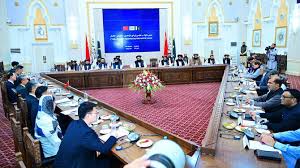Pakistan, China and Afghanistan vow stronger joint action against terrorism

Celina Ali
Islamabad: Pakistan, China and Afghanistan on Wednesday renewed their commitment to intensifying joint efforts against terrorism while deepening cooperation in political, economic and security fields.
The reaffirmation came at the Sixth Trilateral Foreign Ministers Dialogue held in Kabul, attended by Pakistan’s Deputy Prime Minister and Foreign Minister Ishaq Dar, China’s Foreign Minister Wang Yi, and Afghanistan’s Acting Foreign Minister Mawlawi Amir Khan Muttaqi.
According to the Foreign Office (FO), the three sides stressed their determination to strengthen counter-terrorism measures and endorsed broader collaboration in trade, transit, health, education, culture, regional development, and combating drug trafficking. A key highlight of the meeting was the consensus on extending the China-Pakistan Economic Corridor (CPEC) to Afghanistan.

Before the trilateral session, Dar held a bilateral meeting with Amir Khan Muttaqi, in which he voiced concern over the surge in terrorist incidents inside Pakistan linked to groups operating from Afghan territory. He called on Kabul to take “concrete and verifiable measures” against proscribed entities such as the banned Tehreek-e-Taliban Pakistan (TTP), the Balochistan Liberation Army (BLA), and its militant faction, the Majeed Brigade.
This demand followed the United States’ recent designation of the BLA and Majeed Brigade as Foreign Terrorist Organisations. The FO statement noted that Dar had highlighted the alarming rise in cross-border attacks in Pakistan’s Khyber Pakhtunkhwa and Balochistan provinces since 2021.
The Islamabad-based Pakistan Institute for Conflict and Security Studies (PICSS) reported that July witnessed 82 militant attacks across Pakistan, causing 101 fatalities and 150 injuries. Those killed included 47 civilians, 36 security personnel, and 18 militants.
The FO said that both Dar and Muttaqi expressed satisfaction with the positive trajectory of bilateral relations, pointing to recent decisions that had either been implemented or were nearing completion. They welcomed the elevation of diplomatic representation from chargé d’affaires to ambassadorial level, a move agreed at the trilateral meeting in Beijing on 21 May 2025.
The ministers also recalled earlier engagements, including Dar’s visits to Kabul on 19 April and 17 July 2025, and the Beijing dialogue in May, noting that these interactions had significantly boosted trade and transit ties. However, Dar emphasised that progress in counter-terrorism efforts had lagged behind political and commercial advances.
China’s Wang Yi underscored Beijing’s role in reviving trilateral cooperation after a pause since 2023, stressing regional stability as vital to economic integration under the Belt and Road Initiative. The Beijing talks in May had paved the way for the Kabul session, producing commitments to enhance joint security efforts and to expand CPEC into Afghanistan.
Muttaqi reaffirmed Afghanistan’s pledge to prevent its soil from being used by any terrorist organisation against Pakistan or other countries. Dar thanked Afghan authorities for their hospitality and congratulated them on successfully hosting the sixth trilateral dialogue, a platform expected to shape regional cooperation in the coming months.





